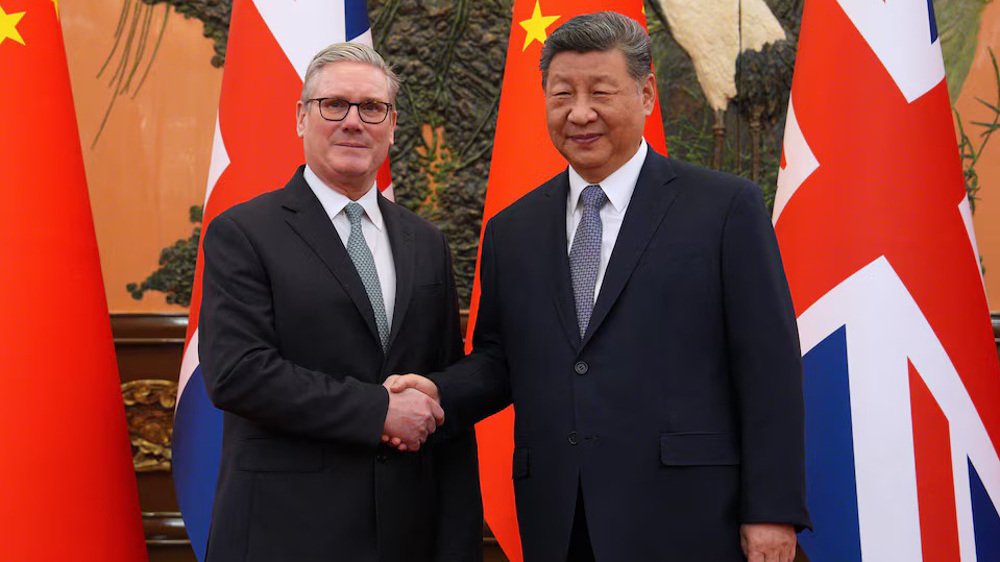China to defend sovereignty in South China Sea: President Xi
Chinese President Xi Jinping tells US counterpart Barack Obama in Washington that Beijing is resolute in defending its sovereignty in the South China Sea.
Xi said that the disputes over the waters should be settled peacefully by relevant claimants through direct talks.
Beijing “respects and safeguards the freedom of navigation and overflight other countries are entitled to under international law,” he said during a meeting with Obama on the sidelines of a global nuclear summit on Thursday.
China claims sovereignty over nearly all of the South China Sea, which is also claimed in part by Taiwan, Brunei, Vietnam, Malaysia and the Philippines. The contested waters are believed to be rich in oil and gas reserves.
The dispute has at times drawn in extra-territorial countries — particularly the United States — which have more often than not sided with China’s rivals.
Recently, the US has increased its presence in the Asia-Pacific region through its so-called pivot strategy, which critics denounce as a provocative policy.
Beijing accuses Washington of meddling in regional issues and deliberately stirring up tensions in the South China Sea.
The US, in turn, accuses Beijing of carrying out what it calls a land reclamation program in the South China Sea by building artificial islands in the disputed areas.
New nuclear missile
On Thursday, a report said experts expected China to deploy a new generation of Chinese intercontinental ballistic missiles believed to be the world’s longest-range with the capacity of carrying multiple warheads.
Richard Fisher, a senior fellow at the International Assessment and Strategy Center in Washington, a US-based think tank, said the missile would be of the DF-41 type, with an operational range of up to 14,500 kilometers (9,000 miles), The Financial Time said.

“Given the number of real reported tests, it is reasonable to speculate the DF-41 will be deployed to PLA Strategic Rocket Force bases in 2016,” Fisher said in reference to the bases of the People’s Liberation Army of China.
The projectile is not comparable in range with the first version of the DF-5, which went into service in 1980.
Fisher said Western estimates put the number of Chinese nuclear missile warheads at a maximum of 20 until roughly 2008, but recent estimates are between 200 and 400.
The US has a stockpile of 4,760 nuclear warheads, according to the Bulletin of Atomic Scientists, a nontechnical academic journal.
“We will see a period of rapid increases in the numbers of China’s nuclear warheads that can reach the United States,” Fisher claimed.
Meanwhile, Tong Zhao, a nuclear security expert at Carnegie-Tsinghua Center for Global Policy in Beijing, said the DF-5 is silo-based, while the DF-41 has a mobile launcher.
News of the DF-41’s deployment first emerged earlier this week in Canada-based military journal Kanwa Asian Defense.
China warns US
On Thursday, China warned the US navy to “be careful” in the South China Sea when asked about latest US patrols in the disputed waters.
“Now, the United States has come back, and is reinforcing its military presence in this region and promoting militarization in the South China Sea,” Chinese Defense Ministry spokesman Yang Yujun told a briefing.
Since last October, the US has conducted two “freedom of navigation” operations, during which it sailed warships within 12 nautical miles of islets claimed by China.
IRGC is on frontline against US, Israeli terrorism: Intelligence Ministry
One killed as Israeli airstrike hits southern Lebanon amid truce breaches
Iran says it has enough deterrence without nukes
EU’s IRGC listing shows elite force effective in foiling Israeli plots: Yemen
VIDEO | Europe hostile move against IRGC
VIDEO | Zionists against the NHS
Trump compromised by Israel, Epstein files reveal
Iran, China, and Russia to hold joint naval exercise















 This makes it easy to access the Press TV website
This makes it easy to access the Press TV website